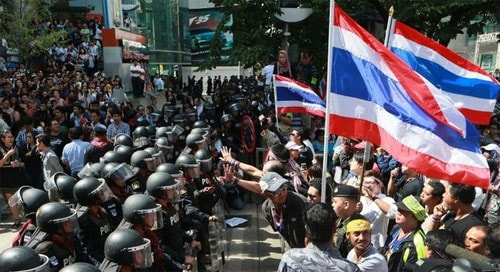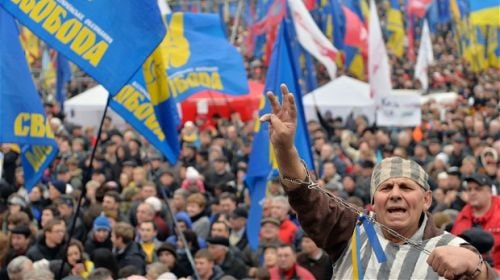Thailand and Ukraine - A spiral with no way out
(Baonghean) -The anti-government protests have been going on for a long time and show no signs of ending. Although there have been moves to ease the tension, finding a common voice between the government and the opposition in the future is almost impossible. The persistent protests in Thailand and Ukraine are attracting great attention from the world public opinion.
In Thailand
In the past 10 years, this country has always been considered to be in a state of instability, with large and small protests breaking out continuously. This party took power, the opposition party immediately protested and the spiral of crisis has not yet found a way out. Remember, in September 2006, Mr. Thaksin Shinawatra was overthrown by the Thai military in a coup after two consecutive resounding victories in the elections in 2001 and 2005. After being overthrown, he had to live in exile abroad. But in the country, his supporters are still numerous because his policies benefit the majority of people living in the vast North and Northeast of Thailand. They continuously organized protests everywhere, many clashes occurred, culminating in May 2010, killing 90 people and injuring more than 1,900.
 |
| Protests erupted in November after Thailand's lower house of parliament passed an amnesty bill that critics said could allow former Prime Minister Thaksin Shinawatra to return safely. Photo: BBC |
Before Ms. Yingluck became the first female Prime Minister of Thailand in 2011, there were two failures of her predecessors. The first was Somchai Wongsawat (Thaksin Shinawatra's brother-in-law), who was dismissed by the Thai parliament in 2008 and Abhisit Vejjajiva replaced Somchai (Abhisit became Prime Minister after a vote in the National Assembly without having to go through a general election). Learning from the failure of her brother as well as the two previous prime ministers. After taking power, Ms. Yingluck ran the government with a moderate policy that somewhat calmed the always "hot" situation in Thailand, and the opposition also received many compliments from the public. After a period of temporary calm, the tense atmosphere broke out again. The reason or "excuse" for the opposition to gather protest forces was clear. It is the amnesty bill proposed by the Pheu Thai Party, which would erase all convictions related to political conflicts since 2004. This is considered the most difficult issue in the 3 years the beautiful female Prime Minister has been in power. Those in the opposition always accuse her of being a puppet and her decisions are all directed by her brother. Of course, the influence of her brother cannot be denied.
Ms. Yingluck Shinawatra's response to the "anger" of the opposition parties was very gentle, even many analysts considered it too weak. Because the protesters, especially Suthep Thaugsuban, continuously had actions that were considered to have exceeded the limit. Some people even said that it was because of those gentle reactions that Suthep became more reckless. Not only did he organize protests, he and his allies also occupied the Ministry of Finance headquarters and several other headquarters. To calm the situation, she decided to dissolve the parliament and call on voters to go to the polls in February 2014. But these moves did not please the opposition leader, who was also wise enough to understand that if there were elections, the victory would fall to the party supporting Ms. Yingluck.
In fact, in the past 10 years, no political party has been able to win through elections. Abhisit Vejjajiva's rise to prime minister was only through a "side door". Suthep's next move was to intensify the protests despite being wanted for "insurrection" and "illegally occupying state headquarters". He also took provocative actions in the hope that the prime minister's government would make mistakes such as suppressing protesters. And that was the excuse for the military to "jump in" and intervene. But until now, the military and the royal family have shown that they will stay out of this political game.
Thai army chief Prayuth Chan-ocha said he had many reasons to keep soldiers out of the political crisis. Thus, since the anti-government protest movement, Suthep Thaugsuban and his supporters have not achieved anything except for the Yingluck government announcing the dissolution of parliament and calling for elections. The latest development that further shows Suthep's disadvantage is that on December 19, Thai media reported that the country's Department of Special Investigation decided to freeze the bank accounts of 18 anti-government protest leaders, including former Deputy Prime Minister Suthep Thaugsuban, and sent summonses to them on charges of inciting riots. A few days earlier, the Thai Election Commission issued a statement urging the caretaker government and anti-government protest leaders to negotiate on the time of the election.
Up to now, the opposition has not shown any signs of cooperation. The February 2014 Thai election will be violent, which is a clear risk and the Pheu Thai Party is likely to win, according to many analysts.
In Ukraine
After the Soviet Union collapsed in 1991, Ukraine also declared independence. The division still exists in social life. The North and Northeast always turn to brotherly Russia, while the West always wants Ukraine to follow the path that many Eastern European countries and the former Soviet Union have chosen. Also after the Soviet Union collapsed, the European Union (EU) always sought to weaken Russia. Their strategy was to expand eastward by continuously admitting new member countries from the Soviet Union and Eastern Europe such as the Czech Republic, Hungary, Poland, Slovakia, Slovenia, Lithuania... in 2004; Romania, Bulgaria in 2007, most recently Croatia in July 2013.
Ukraine is no exception to the vortex of attraction. Partly because this country has a large market with more than 46 million people, partly because of its strategic position so that the EU can balance Russia in many aspects if it has Ukraine. Therefore, the EU and those who support joining the EU constantly put out a picture to deceive the people such as: If the association agreement with the EU is signed, it will pave the way for the accession process and the period of investment in rebuilding Ukraine with large aid from the IMF and WB will begin. Or Ukrainian citizens will be free to travel without visas, free to find jobs in member countries...
 |
| Protesters demand the government sign a treaty with the EU. Photo: Reuters |
But is that really true? Eastern European countries like Romania and Bulgaria have been in the EU for nearly 10 years now, but the economic picture is not bright. And the promise of free movement and employment is still empty. And it is understandable that nearly 50% of people want to leave the EU to join Russia.
If Ukraine follows Russia, what will it gain and lose? If Kiev follows Russia, it will gain a lot and lose nothing. Because now, although it is said to be independent, its economy is still greatly influenced by Russia. Huge debts have not been paid yet, and raw materials such as gas are mostly imported from Russia. In addition, goods produced by Ukraine using outdated technology are only competitive enough in the Russian market or other easy markets, but cannot gain a foothold in the EU market, which is considered the most difficult market in the world. If Kiev follows the EU, Moscow will immediately ask about the debts and will not sell gas to Kiev or import goods from Kiev. It will not only be political instability but also bankruptcy that is very difficult to avoid.
Is the political turmoil of the past four weeks a struggle for influence between the EU and Russia? In some ways it could be. But certainly all the agreements reached after the back-and-forth meetings between Ukrainian President Viktor Yanukovych and Russian President Vladimir Putin seem to favor Russia rather than the EU (Russia will buy $15 billion of Ukrainian bonds and reduce the price of gas for the country by a third).
Ukraine and Russia are the center of the Eastern Slav civilization with the Russian state of Kiev. After several mergers and then divisions. Now they are two independent countries but they are still brothers in the true sense of the word. And the EU's attempt to lure Ukraine and then join them in NATO will continue but it will be very difficult to happen. Because Moscow does not want and cannot allow this to happen because they absolutely do not want to be caught between NATO and the US.
There is no concrete solution to end the political crises in these two countries. The governments of both countries are trying to find common ground with the opposition. Public opinion in these countries as well as internationally is very interested in the next developments. Are Thailand and Ukraine still in a spiral with no way out?
Southern Scenery






